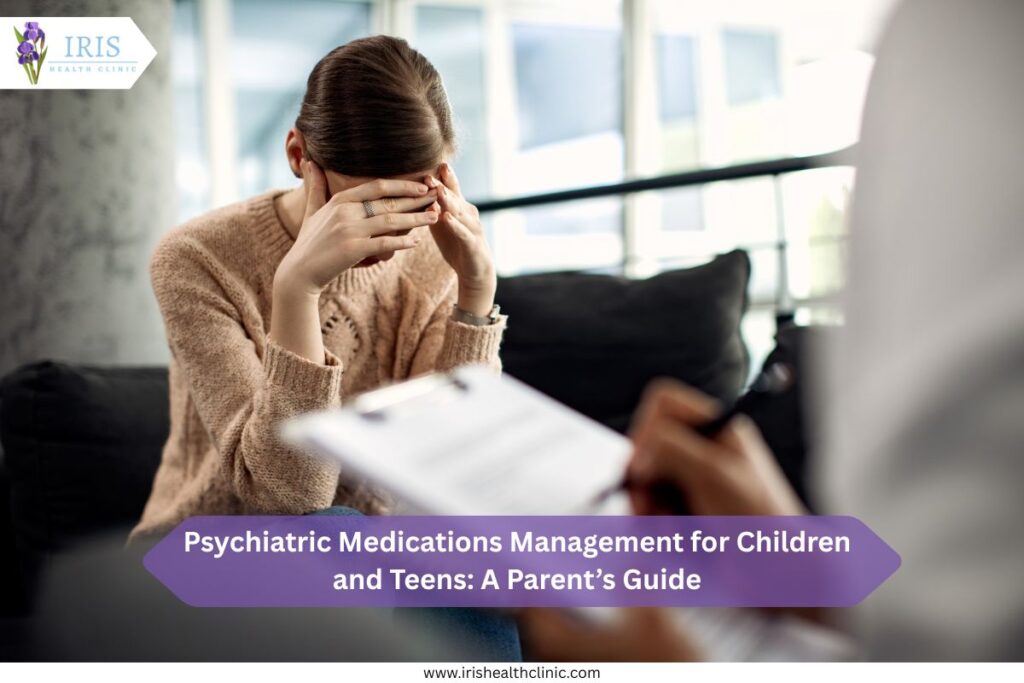Yes, psychiatric medication management can support your child’s mental wellness—but knowing how to navigate it as a parent makes all the difference.
When your child or teen is struggling with mental health challenges, it can feel like you’re walking through a maze with no clear path. During the early stages, parents will usually wonder: Is it a phase, or something more?
If behaviours or moods begin to impede your child’s daily living, you may want to discuss psychiatric medication management as one piece of an overall treatment strategy. This is something that takes compassion, medical acumen, and a group that truly understands children’s mental health requirements.
How Medication Assists Psychiatric Treatment in Teens
Medications are not for “curing” your child. Instead, they are part of a treatment plan for overall mental health. When taken and used as directed, they can help reduce the severity of symptoms that prevent children and teens from functioning well emotionally, academically, or socially.
Unlike older individuals, adolescents and children are still physically and mentally evolving. This is what makes finding the right drug and dosage essential. Brain chemistry is complex, and what may work for one child may not be suitable for another. It is for this reason that a medication management psychiatrist plays such a key role in offering safety, monitoring side effects, and adjusting when needed.
At Iris Health Clinic, our clinicians spend time learning your child’s whole story, including all emotional, psychological, and developmental factors.
What to Expect from a Psychiatrist for Medication Management
The initial evaluation is more than a conversation. A psychiatrist will take into account your child’s medical history, family history, school behaviour, and emotional patterns. From there, a treatment plan tailored to your child may include therapy, lifestyle changes, and—if appropriate—medication.
After medication is prescribed, follow-up appointments are necessary. Child and adolescent psychiatrists closely monitor the effects after weeks or months to ensure the chosen medication is effective without producing side effects. These consultations also provide a time to adjust dosages, try other medications, or determine whether medication is necessary beyond what is initially prescribed.
If you’re seeking psychiatric medication management near me, ensure that the healthcare provider understands pediatric pharmacology and delivers care in partnership with families, therapists, and schools. We are proud to establish this kind of team care that allows your child to succeed in all aspects of life.
Signs Your Child Might Need Medication Management for Mental Health
Children struggle to describe how they are feeling inside. Parents can observe for warning signs that suggest an underlying issue for which treatment by a psychiatrist may be necessary:
- Daily sadness, worry, or irritability
- Trouble concentrating or sitting still in class
- Being mean or frequently changing moods
- Sleeping too much or too little
- Social withdrawal or having difficulty keeping up with friends
If therapy and behavioral interventions haven’t been meeting these needs with standard treatments, perhaps it’s time to add medication management to the mix.
Remember, though, that medication should never be used as the exclusive or first choice of treatment. But when symptoms persist or interfere with daily living, it can be a valuable part of treatment, especially when combined with therapy, family support, and classroom accommodations.
Finding Child-Friendly Psychiatric Medication Management Near Me
The words “psychiatric medication management near me” can lead you to a long list of providers, but they’re not all going to treat children and teens. Look for psychiatric offices with subspecialties in child mental health that offer comprehensive evaluations and keep parents in the loop.
At Iris Health Clinic, we believe that kids’ mental health treatment is never a one-size-fits-all scenario. Our board-certified psychiatric staff takes a respectful and compassionate approach to families. We involve you at every step, from diagnosis to treatment planning and medication management. If your child is experiencing early warning signs or already has a diagnosis, we tailor care to address their individual needs and level of development.

Parental Guidance: How to Make Your Child’s Medication Process Easier
Taking psychiatric medication at home is more than simply administering a pill. You, as a parent, have an essential role in getting your child comfortable and settled.
Here are some things you can do to assist your child:
- Keep a side effect or behavior log. This will help your provider adjust the dosage or find alternatives.
- Encourage open communication. Make sure your child feels free to talk about how they feel, both physically and emotionally.
- Adhere to routines. Medication routines, therapy appointments, and healthy sleeping habits give children a sense of structure and security.
- Provide praise for small accomplishments. Success can come in steps, not bounds. Praise effort, not just outcome.
- And always stay connected with your provider. If something feels off, it probably is. Medication isn’t a “set it and forget it” solution—it’s part of an ongoing conversation.
When Should Medications Be Re-Evaluated?
Even when medication appears to work, regular re-evaluation is required. As children grow up, their biochemistry changes, and so might their symptoms. A dose that once worked wonderfully might need to be tit rated. Or, in some cases, your physician might recommend gradually tapering off the medication altogether.
Regular follow-up with your psychiatrist to review medication is what keeps your child’s treatment up to date with his or her changing needs. At Iris Health Clinic, we schedule regular check-ins as part of our commitment to long-term wellness.
Myths About Medication for Kids
There are a few myths regarding psychiatric medications in children. Let’s bust some of them:
Myth 1: “Medications will change my child’s personality.”
Fact: The right medicine will make your child more himself, less so, not more so.
Myth 2: “Only kids with major problems are on medication.”
Fact: Medication is appropriate for moderate symptoms, especially when symptoms interfere with school or relationships with others.
Myth 3: “Once they’re medicated, they’ll be medicated forever.”
Fact: Most children take medication for the short term, as part of a comprehensive plan that includes therapy and support.
Don’t let myths interfere with your child’s success. Proper medication management can relieve, clarify, and provide a stronger basis for growth.
Final Thoughts: Supporting Your Child on the Path to Mental Wellness
Supporting your child’s mental well-being takes strength, patience, and proper support. Empathetic psychiatric medication management allows children and adolescents to find balance, restore their self-esteem, and achieve their full potential.
No matter if you’re just beginning to look into options or already visiting a provider, remember this: you’re not alone. With the help of a professional, like the personalized care at our clinic, your family can make significant strides towards long-term wellness.
Are you in need of quality psychiatric medication management near you? Iris Health Clinic is here to help your child through their mental health journey with effective, safe, and compassionate care tailored specifically for children and adolescents. Schedule an appointment with our experienced team today.

